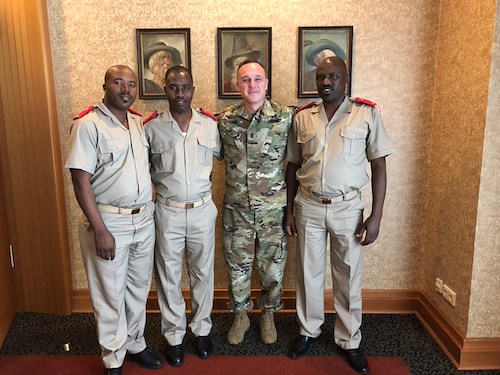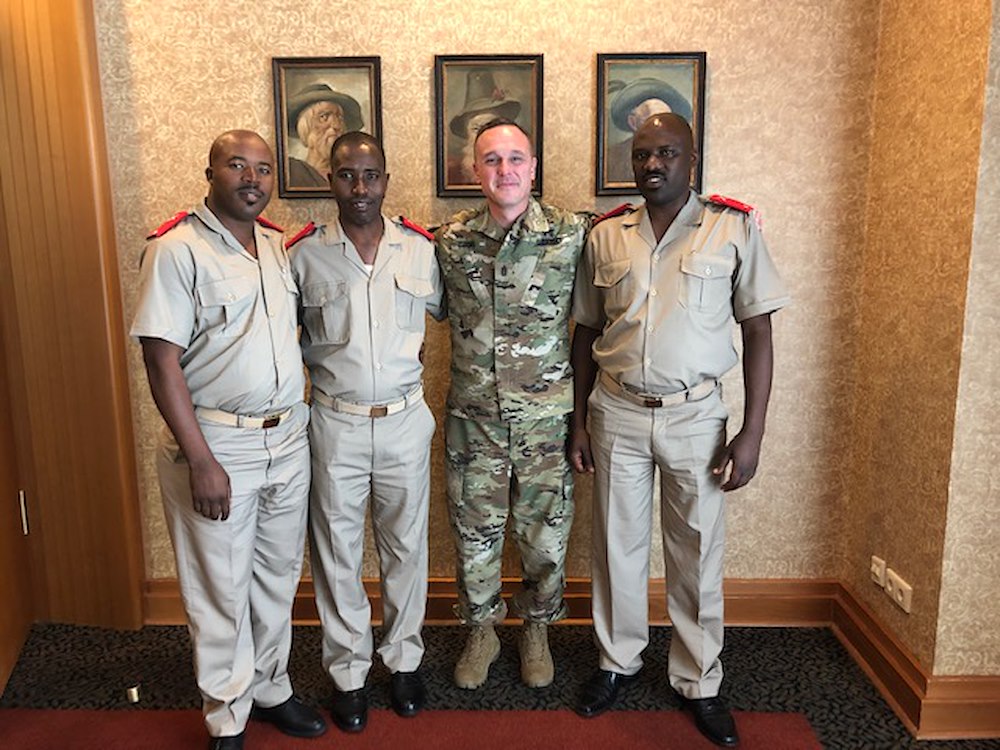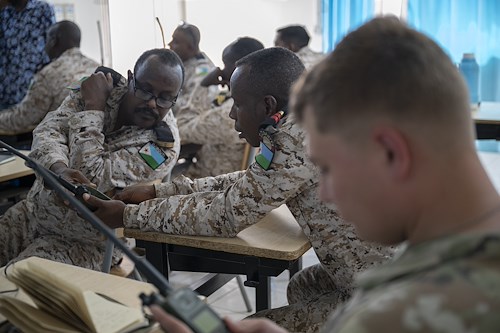Gallery contains 1 image
×
Photo 1 of 1
Forward March
U.S. Army Command Sgt. Maj. Shawn Carns, command senior enlisted leader (SEL), Combined Joint Task Force-Horn of Africa, poses for a photo with SELs from the Burundi National Defence Force during the Africa Senior Enlisted Leader Conference in Garmisch-Partenkirchen, Germany, August 14, 2019. Carns was among a group of 63 SELs from 27 African countries, five component SELs and numerous other SELs who attended the conference, which focused topics such as team building, empowering non-commissioned officers, strategic outlook on enlisted development, curriculum development, and women, peace and security. (Courtesy photo)
Photo by: Command Sgt. Maj. Shawn Carns
“Noncommissioned officers are key to the professionalism of our militaries. Senior enlisted leaders ensure the discipline, espirit de corps, morale, and proficiency of our individual soldiers and unit formations. It’s through your leadership we maintain forces characterized by professional competence and personal character.” ~ Chief Master Sergeant Ramon “CZ” Colon-Lopez, Command Senior Enlisted Leader, U.S. Africa Command
I recently attended the Africa Senior Enlisted Leader Conference in Garmisch-Partenkirchen, Germany. Building on the success of the last two years, the conference focused on team building, the importance of empowering non-commissioned officers (NCOs), strategic outlook on enlisted development, the Security Force Assistance Brigade operation overview, curriculum development, women peace and security, funding processes for professional development and international enlisted engagement program.
Here are my three takeaways from the conference:
1. Team Building
“Army team building is a continuous process of enabling a group of people to reach their goals and improve their effectiveness through leadership and various exercises, activities and techniques. The goal of Army team building is to improve the quality of the team and how it works together to accomplish the mission. Team building is essential for the Army to function and perform, and success for the team depends on the work and cooperation of every member.” ~ Army Techniques Publication (ATP) 6-22.6
Day 1: A group of 63 senior enlisted leaders (SELs) from 27 African countries, five component SELs and numerous other SELs conducted a team building event at the Kletterwald Outdoor Team Building Facility. We conducted two events in a 12 – 16 diverse team. The events challenged our mental capacity, language barrier and physical endurance.
“A key to effective teamwork is the cooperative or coordinated effort of individuals acting together as a group or in the interests of a common goal.” ~ Army Techniques Publication (ATP) 6-22.6
The first event consisted of four planks with 10-foot loops, and the goal was for each team to walk the four planks a total of 150 meters. The second event consisted of five pieces of rope, one carabiner, four blocks of wood with notches and one stand. The goal was for each team to stack the four blocks on the stand. These events were crucial to overcome obstacles as a team. Teams don’t come together by themselves, which is why team building is an essential part of success for any organization, and essential to future engagements between AFRICOM and our African partners.
2. Empowerment
“A leader’s primary responsibility is to empower organizations to operate effectively.” ~ Army Doctrine Publication (ADP) 6-22
“NCOs are like a car engine and shocks. A car doesn’t move or carry weight without an engine and shocks, an organization won’t run or carry weight without an empowered professional NCO Corps.” ~ An African partner Chief of Defense (CHOD)
Four countries (Liberia, Ghana, Malawi and Botswana) make up the 1st Tranche, which is the first group of African countries, chosen due to their stable governance, that will lead the effort to regionalize Professional Military Education across Africa.
African Chiefs of Defense (CHODs) value their SELs for development of the force, tactical, operational and strategic thinking, and morale of the organization. They are setting the example and carrying the word to subordinate commanders to empower their NCO corps and explained for the readiness, stability, security and development of their military, they must empower their NCO corps. To hear the CHODs talk about empowering their NCOs was the most powerful part of this conference. There’s still work to be done as we continue to voice the importance of developing institutionalized training and empowerment of a professional NCO corps.
3. Women, Peace and Security
The women, peace and security discussion included actions to increase women’s participation at all levels of conflict prevention, peace building and peacekeeping initiatives. Traditional and cultural practices perpetuate gender inequality through today, exacerbated by the de-prioritization of the gender equality country agenda. However, Liberia, Ghana, Botswana and Malawi each have women SELs in their military.
Malawian Warrant Officer Rose Kamaliza joined the Malawi Defence Force in 1999 as an infantry woman, and is the first-ever African woman to graduate from the U.S. Sergeant Major Course. Liberian Master Sgt. Joyce Akoi joined the Armed Forces of Liberia in 2016 as an administrative clerk. Currently, she serves as the administrative clerk to the chief of staff of the Armed Forces of Liberia. These women are empowered to speak up, set the example and give advice as needed to their officer counter parts. This was the first time in the history of the Africa Senior Enlisted Leader Conference that women participated in a presenting role at the conference.
The AFRICOM Senior Enlisted Leader Conference was a venue to invest in the African professional NCO corps. There are still obstacles that must be overcome in doctrine development, instructor training and information sharing, but with continued dialogue and collaboration we can overcome anything with a networked, professional NCO corps.








